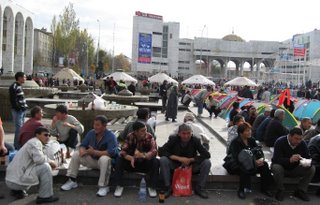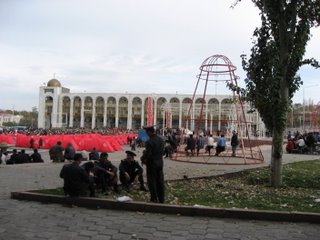

November 4, 2006
I expected the protests to be at their strongest on Thursday, the first day. So I was surprised when my boss called yesterday afternoon. On vacation, she was at home watching TV.
“It’s getting bad,” she said. “I don’t expect anything good to come of this. Close the office, take the important documents, and make sure everyone gets home safely.”
We stopped a seminar in progress and canceled a scheduled party that evening to say goodbye to a departing colleague. The staff grumbled that the fun, drunken Friday evening they’d imagined wouldn’t take place. They seemed to consider getting together anyway.
“The café is far from the center,” they said. “Nothing will happen there.”
But when we went on the internet and saw headlines that several Parliament members had gone into the national broadcasting building and that protestors had stormed a local government building, they agreed with the closing.
As much as CNN can get on my nerves, with the same stories repeated over and over, and the often emotional, rather than analytical reporting, at that moment I wished for a Kyrgyz version of CNN, someplace where I could see what was going on at the moment. My two TV channels are Russian channels and even they don’t show up well. And news in Kyrgyzstan is slow to get to the Russian or Western web sites.
I was curious to see what was going on, but decided to play it safe. The anxiety in Maria’s voice had transferred itself to me and I found myself afraid to go home alone on my bicycle. My unpleasant experience in Nicaragua lowered my risk acceptability level substantially.
I walked, together with several staff members who lived in the same direction. Again, the activity on the streets wasn’t much different from usual. Autumn leaves swirled down onto people selling grapes, strawberries, apples, flowers, carrots, eggplant and peppers. Marshrutkas took their passengers home. Cars with little yellow taxi signs atop waiting along the roadsides for passengers.
After arriving home, I began to feel more tranquil, as I was again completely cut off from news. And in my immediate environment, everything appeared normal.
I decided to go out to the internet café. I felt more comfortable being out on the street when I had nothing worth stealing on me. I expected the internet café might be closed, but clients were there as usual, gambling at the numbers tables, making internet-based telephone calls. Two young girls next to me compared notes on pictures of young men they were looking at online. Every entrepreneur had to make the decision for themselves – to close shop and lose profit, or to stay open and take the risk.
Possibly, being there was a good form of protection. At least they could take some action or try to talk looters out of doing something should such activities begin.
“You’re staying here tonight,” I heard a man tell the man who sold me vegetables at the market on my way home.
“Why?” the man asked.
“For security. What do you think?”
This morning I spoke to my friend Zhenya and she told me she’d gone to visit the square yesterday afternoon.
“The people who are in the tents are such simple, poor people,” she said. “There is no way they are part of an opposition party. I went up to one tent and asked a woman who she wanted to be President. She said she didn’t know, just not Bakiyev.”
I decided this afternoon I’d go take a look for myself. When I approached, I saw people crowded around a truck. When I looked in, I saw it was filled with individual portions of food in white plastic containers. They were being distributed to the protestors, people who don’t have enough money to feed themselves – people for whom a free meal is an inducement to join a political movement.
On the stage, men made speeches, first in Kyrgyz, then translated into Russian. Most attendees were men, and almost all were Kyrgyz. These type of activities seem to lead the Russians to emigrate rather than earn their support.
The atmosphere was relaxed. Police officers sat together in the grass. Protestors, appearing poor and rural as Zhenya had said, sat on ledges, eating the food that had been distributed to them. They didn’t look too energized or as though they had a cause.
A few yurts were lined up next to the stage. Several rows of tents spread out on either side, toward the main road, which was open. On one side, all the tents were red, the opposition’s colors. And some protestors wore red fabric tied around their necks.
I watched a young boy emerge from a red tent and put on his shoes. A collection of shoes lay outside the tent’s door. Even when living in a tent on the central square, the Kyrgyz maintain their politeness and hygiene. I wondered about this boy’s life circumstances, what kind of family he has that brought him out to live in the chilly autumn on the central square. He was dressed pretty well. I wonder whether the people in the red tents are those connected to the opposition politicians and those in the varied tents are the poor who are living out there for money.
Near the square, several small vendors were doing good business selling sour milk balls, drinks, chips and rolls. And the traffic flowed by as always, including the beribboned and honking entourages of post-Ramadan wedding parties. One car belonging to a wedding party broke down, directly across from the protests.
Another block or two away, children played at the playground and adults strolled down the leaf-strewn paths of the central park. People live and wait and hope that everything will end calmly.



No comments:
Post a Comment